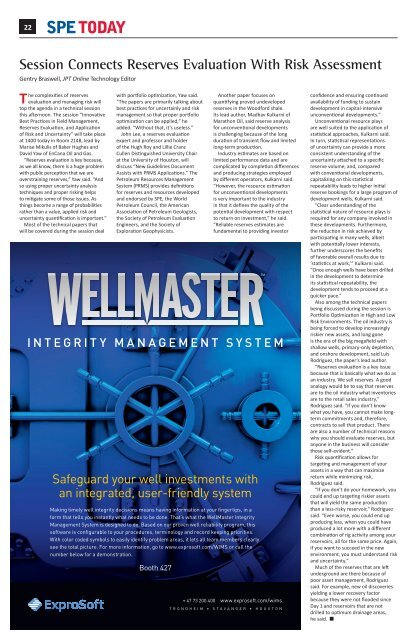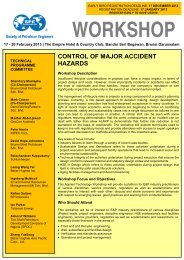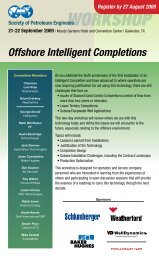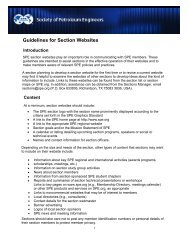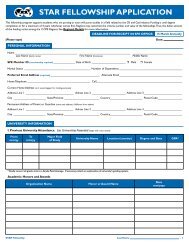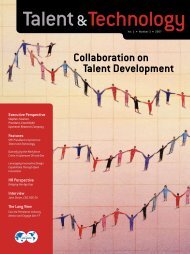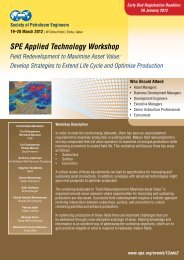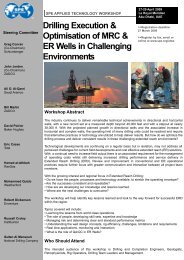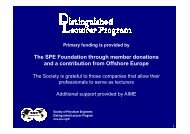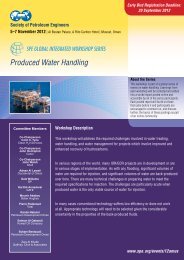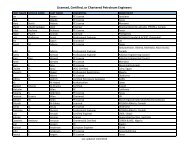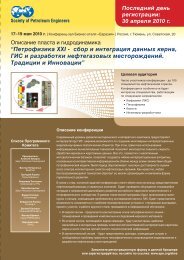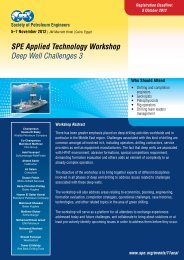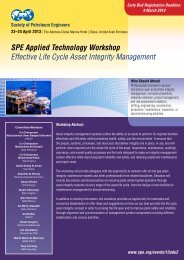Day 1 - Society of Petroleum Engineers
Day 1 - Society of Petroleum Engineers
Day 1 - Society of Petroleum Engineers
Create successful ePaper yourself
Turn your PDF publications into a flip-book with our unique Google optimized e-Paper software.
WellMaster ad SPE Show Daily.indd 1<br />
8/2/12 9:54 AM<br />
22<br />
SPE TODAY<br />
Session Connects Reserves Evaluation With Risk Assessment<br />
Gentry Braswell, JPT Online Technology Editor<br />
The complexities <strong>of</strong> reserves<br />
evaluation and managing risk will<br />
top the agenda in a technical session<br />
this afternoon. The session “Innovative<br />
Best Practices in Field Management,<br />
Reserves Evaluation, and Application<br />
<strong>of</strong> Risk and Uncertainty” will take place<br />
at 1400 today in Room 214B, lead by<br />
Marise Mikulis <strong>of</strong> Baker Hughes and<br />
David Yaw <strong>of</strong> EnCana Oil and Gas.<br />
“Reserves evaluation is key because,<br />
as we all know, there is a huge problem<br />
with public perception that we are<br />
overstraining reserves,” Yaw said. “And<br />
so using proper uncertainty analysis<br />
techniques and proper risking helps<br />
to mitigate some <strong>of</strong> those issues. As<br />
things become a range <strong>of</strong> probabilities<br />
rather than a value, applied risk and<br />
uncertainty quantification is important.”<br />
Most <strong>of</strong> the technical papers that<br />
will be covered during the session deal<br />
with portfolio optimization, Yaw said.<br />
“The papers are primarily talking about<br />
best practices for uncertainly and risk<br />
management so that proper portfolio<br />
optimization can be applied,” he<br />
added. “Without that, it’s useless.”<br />
John Lee, a reserves evaluation<br />
expert and pr<strong>of</strong>essor and holder<br />
<strong>of</strong> the Hugh Roy and Lillie Cranz<br />
Cullen Distinguished University Chair<br />
at the University <strong>of</strong> Houston, will<br />
discuss “New Guidelines Document<br />
Assists with PRMS Applications.” The<br />
<strong>Petroleum</strong> Resources Management<br />
System (PRMS) provides definitions<br />
for reserves and resources developed<br />
and endorsed by SPE, the World<br />
<strong>Petroleum</strong> Council, the American<br />
Association <strong>of</strong> <strong>Petroleum</strong> Geologists,<br />
the <strong>Society</strong> <strong>of</strong> <strong>Petroleum</strong> Evaluation<br />
<strong>Engineers</strong>, and the <strong>Society</strong> <strong>of</strong><br />
Exploration Geophysicists.<br />
Another paper focuses on<br />
quantifying proved undeveloped<br />
reserves in the Woodford shale.<br />
Its lead author, Madhav Kulkarni <strong>of</strong><br />
Marathon Oil, said reserve analysis<br />
for unconventional developments<br />
is challenging because <strong>of</strong> the long<br />
duration <strong>of</strong> transient flow and limited<br />
long-term production.<br />
Industry estimates are based on<br />
limited performance data and are<br />
complicated by completion differences<br />
and producing strategies employed<br />
by different operators, Kulkarni said.<br />
“However, the resource estimation<br />
for unconventional developments<br />
is very important to the industry<br />
in that it defines the quality <strong>of</strong> the<br />
potential development with respect<br />
to return on investment,” he said.<br />
“Reliable reserves estimates are<br />
fundamental to providing investor<br />
INTEGRITY MANAGEMENT SYSTEM<br />
Safeguard your well investments with<br />
an integrated, user-friendly system<br />
Making timely well integrity decisions means having information at your fingertips, in a<br />
form that tells you instantly what needs to be done. That’s what the WellMaster Integrity<br />
Management System is designed to do. Based on our proven well reliability program, this<br />
s<strong>of</strong>tware is configurable to your procedures, terminology and record keeping priorities.<br />
With color coded symbols to easily identify problem areas, it lets all team members clearly<br />
see the total picture. For more information, go to www.expros<strong>of</strong>t.com/WIMS or call the<br />
number below for a demonstration.<br />
Booth 427<br />
+ 47 73 200 400 www.expros<strong>of</strong>t.com/wims<br />
TRONDHEIM • STAVANGER • HOUSTON<br />
confidence and ensuring continued<br />
availability <strong>of</strong> funding to sustain<br />
development in capital-intensive<br />
unconventional developments.”<br />
Unconventional resource plays<br />
are well suited to the application <strong>of</strong><br />
statistical approaches, Kulkarni said.<br />
In turn, statistical representations<br />
<strong>of</strong> uncertainty can provide a more<br />
consistent understanding <strong>of</strong> the<br />
uncertainty attached to a specific<br />
reserve volume, and, compared<br />
with conventional developments,<br />
capitalizing on this statistical<br />
repeatability leads to higher initial<br />
reserve bookings for a large program <strong>of</strong><br />
development wells, Kulkarni said.<br />
“Clear understanding <strong>of</strong> the<br />
statistical nature <strong>of</strong> resource plays is<br />
required for any company involved in<br />
these developments. Furthermore,<br />
the reduction in risk achieved by<br />
participating in many wells, albeit<br />
with potentially lower interests,<br />
further underscores the benefits<br />
<strong>of</strong> favorable overall results due to<br />
‘statistics at work,’” Kulkarni said.<br />
“Once enough wells have been drilled<br />
in the development to determine<br />
its statistical repeatability, the<br />
development tends to proceed at a<br />
quicker pace.”<br />
Also among the technical papers<br />
being discussed during the session is<br />
Portfolio Optimization in High and Low<br />
Risk Environments. The oil industry is<br />
being forced to develop increasingly<br />
riskier new assets, and long gone<br />
is the era <strong>of</strong> the big megafield with<br />
shallow wells, primary-only depletion,<br />
and onshore development, said Luis<br />
Rodriguez, the paper’s lead author.<br />
“Reserves evaluation is a key issue<br />
because that is basically what we do as<br />
an industry. We sell reserves. A good<br />
analogy would be to say that reserves<br />
are to the oil industry what inventories<br />
are to the retail sales industry,”<br />
Rodriguez said. “If you don’t know<br />
what you have, you cannot make longterm<br />
commitments and, therefore,<br />
contracts to sell that product. There<br />
are also a number <strong>of</strong> technical reasons<br />
why you should evaluate reserves, but<br />
anyone in the business will consider<br />
those self-evident.”<br />
Risk quantification allows for<br />
targeting and management <strong>of</strong> your<br />
assets in a way that can maximize<br />
return while minimizing risk,<br />
Rodriguez said.<br />
“If you don’t do your homework, you<br />
could end up targeting riskier assets<br />
that will yield the same production<br />
than a less-risky reservoir,” Rodriguez<br />
said. “Even worse, you could end up<br />
producing less, when you could have<br />
produced a lot more with a different<br />
combination <strong>of</strong> rig activity among your<br />
reservoirs, all for the same price. Again,<br />
if you want to succeed in the new<br />
environment, you must understand risk<br />
and uncertainty.”<br />
Much <strong>of</strong> the reserves that are left<br />
underground are there because <strong>of</strong><br />
poor asset management, Rodriguez<br />
said. For example, new oil discoveries<br />
yielding a lower recovery factor<br />
because they were not flooded since<br />
<strong>Day</strong> 1 and reservoirs that are not<br />
drilled to optimum drainage areas,<br />
he said.


